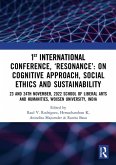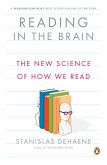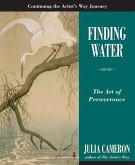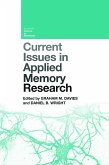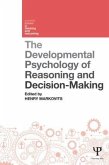Knowing and Learning in Interaction
Integrating Social and Cognitive Theories
Herausgeber: Disessa, Andrea A.; Levin, Mariana; Brown, John Seely
Knowing and Learning in Interaction
Integrating Social and Cognitive Theories
Herausgeber: Disessa, Andrea A.; Levin, Mariana; Brown, John Seely
- Broschiertes Buch
- Merkliste
- Auf die Merkliste
- Bewerten Bewerten
- Teilen
- Produkt teilen
- Produkterinnerung
- Produkterinnerung
Knowing and Learning in Interaction attempts to kick-start a serious, new line of work that merges, or properly articulates, different research traditions with their divergent historical, theoretical, and methodological commitments that, nonetheless, both focus on the highly detailed analysis of processes of knowing and learning as they unfold in interactional contexts in real time.
Andere Kunden interessierten sich auch für
![Cognitive Approach, Social Ethics and Sustainability Cognitive Approach, Social Ethics and Sustainability]() Cognitive Approach, Social Ethics and Sustainability64,99 €
Cognitive Approach, Social Ethics and Sustainability64,99 €![Queer Theory in Education Queer Theory in Education]() Queer Theory in Education95,99 €
Queer Theory in Education95,99 €![Reading in the Brain Reading in the Brain]() Stanislas DehaeneReading in the Brain18,99 €
Stanislas DehaeneReading in the Brain18,99 €![Finding Water Finding Water]() Julia CameronFinding Water16,99 €
Julia CameronFinding Water16,99 €![The Demon and the Angel The Demon and the Angel]() Edward HirschThe Demon and the Angel21,99 €
Edward HirschThe Demon and the Angel21,99 €![Current Issues in Applied Memory Research Current Issues in Applied Memory Research]() Current Issues in Applied Memory Research76,99 €
Current Issues in Applied Memory Research76,99 €![The Developmental Psychology of Reasoning and Decision-Making The Developmental Psychology of Reasoning and Decision-Making]() The Developmental Psychology of Reasoning and Decision-Making66,99 €
The Developmental Psychology of Reasoning and Decision-Making66,99 €-
-
-
Knowing and Learning in Interaction attempts to kick-start a serious, new line of work that merges, or properly articulates, different research traditions with their divergent historical, theoretical, and methodological commitments that, nonetheless, both focus on the highly detailed analysis of processes of knowing and learning as they unfold in interactional contexts in real time.
Hinweis: Dieser Artikel kann nur an eine deutsche Lieferadresse ausgeliefert werden.
Hinweis: Dieser Artikel kann nur an eine deutsche Lieferadresse ausgeliefert werden.
Produktdetails
- Produktdetails
- Verlag: Taylor & Francis Ltd
- Seitenzahl: 544
- Erscheinungstermin: 31. Dezember 2023
- Englisch
- Abmessung: 229mm x 152mm x 9mm
- ISBN-13: 9781138797154
- ISBN-10: 1138797154
- Artikelnr.: 59997209
- Herstellerkennzeichnung
- Libri GmbH
- Europaallee 1
- 36244 Bad Hersfeld
- 06621 890
- Verlag: Taylor & Francis Ltd
- Seitenzahl: 544
- Erscheinungstermin: 31. Dezember 2023
- Englisch
- Abmessung: 229mm x 152mm x 9mm
- ISBN-13: 9781138797154
- ISBN-10: 1138797154
- Artikelnr.: 59997209
- Herstellerkennzeichnung
- Libri GmbH
- Europaallee 1
- 36244 Bad Hersfeld
- 06621 890
Section I: Orientation
Studying knowing and learning in interaction: Knowledge Analysis and
Interaction
Analysis
Brown, N. J. S., Levin, M., & diSessa, A.
Knowledge Analysis: An introduction
diSessa, A., Sherin, B., & Levin, M.
Interaction Analysis revisited: Old assumptions and new methods in studies
of knowing,
learning, and teaching
Hall, R., & Stevens, R.
Section II: Empirical and Theoretical Work
Ecologies of knowing: Lessons from the highly tailored practice of hobbies
Azevedo, F. & Lee, V.
Feedback-relevant places during explanatory narratives
Brown, N. J. S.
Socializing coordination class theory
Danish, J. Enyedy, N. & Parnafes, O.
Perspectives on the clinical interview as an interactive genre
diSessa, A., Michaels, S. & Greeno, J.
Bridging Knowledge Analysis and Interaction Analysis through understanding
the
dynamics of knowledge-in-use
Gupta, A., Elby, A., Stevens, R. & Sawtelle, V.
Gestures, speech, and manipulation of objects as a window and interface to
individual
cognition
Kapon, S.
A coordination class theory lens on disciplined perception
Levin, M. & diSessa, A.
Examining typicality and variability of discourse in cognitive clinical
interviews of student
science knowledge
Russ, R., Lee, V. & Sherin, B.
Uncloaking epistemologies through Interaction Analysis
Umphress, J.
Section III: Dialogue
On the interplay between natural descriptive and hidden machinery
orientations to
Knowledge and Interaction Analysis
Hall, R., Nemirovsky, R, Ma, J. & Kelton, M.
Commentary
TBD
Ensemble learning and knowing: Developing a walking scale geometry dilation
strategy
Ma, J.
Commentary
Hammer, D., & Conlin, L.
Interaction Analysis and the study of the imaginary
Nemirovsky, R. & Kelton, M.
Commentary
Brown, N. J. S.
Computational analysis and the importance of interactional detail or "Does
all that stuff
really matter?"
Sherin, B.
Commentary
TBD
When and what is Protein? A micro-ethnographic case study of concept
formation among a
young child and his consociates at home and school
Stevens, R.
Commentary
TBD
Section IV: Synthesis, Conclusions, and Prospects
Jim Greeno, Professor Emeritus of Education at Stanford University and
Visiting Scholar at
University of Pittsburgh will write the first of the chapters in the final
section of the volume.
Allan Collins, Professor Emeritus of Education and Social Policy at
Northwestern University,
will provide a second perspective on frontiers and future prospects for the
agenda developed in
this volume. He was the founding editor of the journal Cognitive Science
and the first chair of the Cognitive Science Society.
Studying knowing and learning in interaction: Knowledge Analysis and
Interaction
Analysis
Brown, N. J. S., Levin, M., & diSessa, A.
Knowledge Analysis: An introduction
diSessa, A., Sherin, B., & Levin, M.
Interaction Analysis revisited: Old assumptions and new methods in studies
of knowing,
learning, and teaching
Hall, R., & Stevens, R.
Section II: Empirical and Theoretical Work
Ecologies of knowing: Lessons from the highly tailored practice of hobbies
Azevedo, F. & Lee, V.
Feedback-relevant places during explanatory narratives
Brown, N. J. S.
Socializing coordination class theory
Danish, J. Enyedy, N. & Parnafes, O.
Perspectives on the clinical interview as an interactive genre
diSessa, A., Michaels, S. & Greeno, J.
Bridging Knowledge Analysis and Interaction Analysis through understanding
the
dynamics of knowledge-in-use
Gupta, A., Elby, A., Stevens, R. & Sawtelle, V.
Gestures, speech, and manipulation of objects as a window and interface to
individual
cognition
Kapon, S.
A coordination class theory lens on disciplined perception
Levin, M. & diSessa, A.
Examining typicality and variability of discourse in cognitive clinical
interviews of student
science knowledge
Russ, R., Lee, V. & Sherin, B.
Uncloaking epistemologies through Interaction Analysis
Umphress, J.
Section III: Dialogue
On the interplay between natural descriptive and hidden machinery
orientations to
Knowledge and Interaction Analysis
Hall, R., Nemirovsky, R, Ma, J. & Kelton, M.
Commentary
TBD
Ensemble learning and knowing: Developing a walking scale geometry dilation
strategy
Ma, J.
Commentary
Hammer, D., & Conlin, L.
Interaction Analysis and the study of the imaginary
Nemirovsky, R. & Kelton, M.
Commentary
Brown, N. J. S.
Computational analysis and the importance of interactional detail or "Does
all that stuff
really matter?"
Sherin, B.
Commentary
TBD
When and what is Protein? A micro-ethnographic case study of concept
formation among a
young child and his consociates at home and school
Stevens, R.
Commentary
TBD
Section IV: Synthesis, Conclusions, and Prospects
Jim Greeno, Professor Emeritus of Education at Stanford University and
Visiting Scholar at
University of Pittsburgh will write the first of the chapters in the final
section of the volume.
Allan Collins, Professor Emeritus of Education and Social Policy at
Northwestern University,
will provide a second perspective on frontiers and future prospects for the
agenda developed in
this volume. He was the founding editor of the journal Cognitive Science
and the first chair of the Cognitive Science Society.
Section I: Orientation
Studying knowing and learning in interaction: Knowledge Analysis and
Interaction
Analysis
Brown, N. J. S., Levin, M., & diSessa, A.
Knowledge Analysis: An introduction
diSessa, A., Sherin, B., & Levin, M.
Interaction Analysis revisited: Old assumptions and new methods in studies
of knowing,
learning, and teaching
Hall, R., & Stevens, R.
Section II: Empirical and Theoretical Work
Ecologies of knowing: Lessons from the highly tailored practice of hobbies
Azevedo, F. & Lee, V.
Feedback-relevant places during explanatory narratives
Brown, N. J. S.
Socializing coordination class theory
Danish, J. Enyedy, N. & Parnafes, O.
Perspectives on the clinical interview as an interactive genre
diSessa, A., Michaels, S. & Greeno, J.
Bridging Knowledge Analysis and Interaction Analysis through understanding
the
dynamics of knowledge-in-use
Gupta, A., Elby, A., Stevens, R. & Sawtelle, V.
Gestures, speech, and manipulation of objects as a window and interface to
individual
cognition
Kapon, S.
A coordination class theory lens on disciplined perception
Levin, M. & diSessa, A.
Examining typicality and variability of discourse in cognitive clinical
interviews of student
science knowledge
Russ, R., Lee, V. & Sherin, B.
Uncloaking epistemologies through Interaction Analysis
Umphress, J.
Section III: Dialogue
On the interplay between natural descriptive and hidden machinery
orientations to
Knowledge and Interaction Analysis
Hall, R., Nemirovsky, R, Ma, J. & Kelton, M.
Commentary
TBD
Ensemble learning and knowing: Developing a walking scale geometry dilation
strategy
Ma, J.
Commentary
Hammer, D., & Conlin, L.
Interaction Analysis and the study of the imaginary
Nemirovsky, R. & Kelton, M.
Commentary
Brown, N. J. S.
Computational analysis and the importance of interactional detail or "Does
all that stuff
really matter?"
Sherin, B.
Commentary
TBD
When and what is Protein? A micro-ethnographic case study of concept
formation among a
young child and his consociates at home and school
Stevens, R.
Commentary
TBD
Section IV: Synthesis, Conclusions, and Prospects
Jim Greeno, Professor Emeritus of Education at Stanford University and
Visiting Scholar at
University of Pittsburgh will write the first of the chapters in the final
section of the volume.
Allan Collins, Professor Emeritus of Education and Social Policy at
Northwestern University,
will provide a second perspective on frontiers and future prospects for the
agenda developed in
this volume. He was the founding editor of the journal Cognitive Science
and the first chair of the Cognitive Science Society.
Studying knowing and learning in interaction: Knowledge Analysis and
Interaction
Analysis
Brown, N. J. S., Levin, M., & diSessa, A.
Knowledge Analysis: An introduction
diSessa, A., Sherin, B., & Levin, M.
Interaction Analysis revisited: Old assumptions and new methods in studies
of knowing,
learning, and teaching
Hall, R., & Stevens, R.
Section II: Empirical and Theoretical Work
Ecologies of knowing: Lessons from the highly tailored practice of hobbies
Azevedo, F. & Lee, V.
Feedback-relevant places during explanatory narratives
Brown, N. J. S.
Socializing coordination class theory
Danish, J. Enyedy, N. & Parnafes, O.
Perspectives on the clinical interview as an interactive genre
diSessa, A., Michaels, S. & Greeno, J.
Bridging Knowledge Analysis and Interaction Analysis through understanding
the
dynamics of knowledge-in-use
Gupta, A., Elby, A., Stevens, R. & Sawtelle, V.
Gestures, speech, and manipulation of objects as a window and interface to
individual
cognition
Kapon, S.
A coordination class theory lens on disciplined perception
Levin, M. & diSessa, A.
Examining typicality and variability of discourse in cognitive clinical
interviews of student
science knowledge
Russ, R., Lee, V. & Sherin, B.
Uncloaking epistemologies through Interaction Analysis
Umphress, J.
Section III: Dialogue
On the interplay between natural descriptive and hidden machinery
orientations to
Knowledge and Interaction Analysis
Hall, R., Nemirovsky, R, Ma, J. & Kelton, M.
Commentary
TBD
Ensemble learning and knowing: Developing a walking scale geometry dilation
strategy
Ma, J.
Commentary
Hammer, D., & Conlin, L.
Interaction Analysis and the study of the imaginary
Nemirovsky, R. & Kelton, M.
Commentary
Brown, N. J. S.
Computational analysis and the importance of interactional detail or "Does
all that stuff
really matter?"
Sherin, B.
Commentary
TBD
When and what is Protein? A micro-ethnographic case study of concept
formation among a
young child and his consociates at home and school
Stevens, R.
Commentary
TBD
Section IV: Synthesis, Conclusions, and Prospects
Jim Greeno, Professor Emeritus of Education at Stanford University and
Visiting Scholar at
University of Pittsburgh will write the first of the chapters in the final
section of the volume.
Allan Collins, Professor Emeritus of Education and Social Policy at
Northwestern University,
will provide a second perspective on frontiers and future prospects for the
agenda developed in
this volume. He was the founding editor of the journal Cognitive Science
and the first chair of the Cognitive Science Society.


